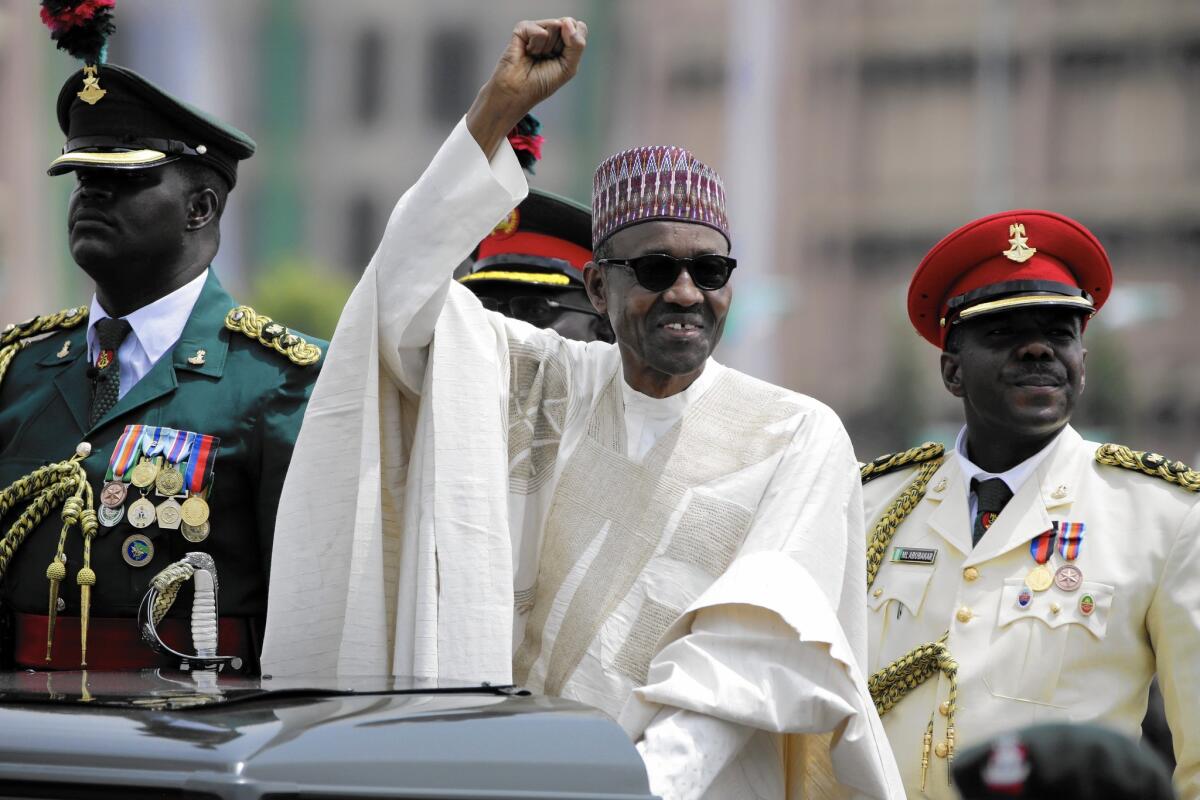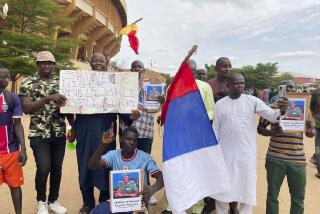President Obama again leaves Nigeria off his Africa trip itinerary

- Share via
reporting from JOHANNESBURG, South Africa — Nigeria felt slighted when President Obama overlooked the vast nation on his first African trip as head of state in 2009, instead visiting its shrimp-sized neighbor, Ghana, where he lauded the smaller country’s democratic achievements.
Obama left Nigeria out again in his 2013 visit to Africa. Now, as he prepares for his third and likely final trip to the continent as president, Nigeria is once more being bypassed in favor of Kenya and Ethiopia.
If democratic achievements play a role in the president’s itinerary, Nigerians may be wondering: Why?
In March, the vast and divided country of 170 million staged one of the continent’s most significant elections — the country’s first democratic change of power since the end of military rule in 1999.
In contrast, Ethiopia’s election in May saw the ruling party, criticized by human rights organizations for its oppression of opposition members, journalists, critics and bloggers, win every seat in the parliament.
An independent democracy watchdog, Freedom House, described the Ethiopia vote as “far from free and fair.” Yet Obama, who has placed great emphasis on human rights and democracy in Africa, will become the first sitting U.S. president to visit Ethiopia, this month, in a move criticized by rights groups.
Nigeria, the continent’s most populous country, is sub-Saharan Africa’s largest economy and an important source of oil for the United States. Its hurt pride at being left off Obama’s itinerary comes at a time of damaged relations between the two countries.
Attempts at military cooperation in the fight against the Nigerian militant group Boko Haram crumbled toward the end of former President Goodluck Jonathan’s term. Jonathan was defeated in the March election by former military dictator Muhammadu Buhari.
There is a consolation prize for Nigeria: On Monday, Obama hosts the new Nigerian president in Washington for talks on increased U.S. assistance in the war against Boko Haram, an Islamic State-linked group with a horrific human rights record.
Boko Haram has been blamed for beheadings of civilians accused of being spies; attacks and killings of schoolboys and teachers; military-style attacks on villages in which hundreds of civilians have been shot, burned or slaughtered like goats; abductions and rapes of hundreds of women and girls; and bombings in crowded markets and bus stations.
The White House has described Buhari’s visit as marking “our support for the Nigerian people following their historic elections and peaceful transfer of power.”
U.S. officials have also indicated their willingness to cooperate with Nigeria in its bid to recover billions of dollars in government funds looted by past officials and salted away in foreign bank accounts.
“President [Obama] has long seen Nigeria as arguably the most important strategic country in sub-Saharan Africa. The question is would there be an opportunity to deepen our engagement and that opportunity is now,” said U.S. Deputy Secretary of State Tony Blinken, according to the Reuters news agency.
Given that, it’s not immediately clear why Obama chose to leave Nigeria off his itinerary. Boko Haram may pose a security threat, but so does Shabab in Kenya. Nigeria’s record on corruption is poor, but so is Kenya’s. And Ethiopia is not nearly as free and democratic as Nigeria.
A key factor may be that the United States views East Africa overall as more important strategically than West Africa. (Kenya and Ethiopia are in the east, Nigeria in the west.) And Kenya has personal resonance for Obama, whose father was born there.
Last year, Nigerian officials voiced anger over America’s refusal to sell Nigeria military helicopters seen as crucial in the fight against Boko Haram — a result of U.S. law that forbids sales of military equipment to countries whose military is implicated in gross rights abuses. When the U.S. offered to train a battalion, Nigerian officials rebuffed the team of trainers sent to Nigeria’s capital, Abuja.
Ethiopia, meanwhile, gets about $800 million a year in U.S. military assistance and aid because of its role in the fight against the Somali militant group Shabab.
Since taking power, Buhari has fired the top military commanders and promised to investigate human rights abuses exposed in a recent Amnesty International report, which accused the military of causing 8,000 deaths of Boko Haram suspects, rounded up arbitrarily and kept in intolerable conditions in military detention, lacking adequate food or water.
Buhari’s dismissals of service chiefs and pledge to take military abuses seriously may open the way to sales of military equipment and increased military cooperation.
He has made defeating Boko Haram and restoring peace and stability in the northeast of the country his top priority, but the group, driven from many northern towns and villages at the end of Jonathan’s term, has regrouped, launching almost daily terrorist attacks in the north. In recent days, it unleashed a series of bombings at the end of Ramadan that killed at least 65 people.
One of the suicide bombings Friday was carried out by a girl who looked about 10 years old, according to Nigerian army officials.
Buhari is confronting a raft of other problems: a budget crisis, with teachers and public servants unpaid in some areas; entrenched corruption; and widespread inequality and poverty, particularly in the north, where the Boko Haram insurgency has been raging.
More to Read
Sign up for Essential California
The most important California stories and recommendations in your inbox every morning.
You may occasionally receive promotional content from the Los Angeles Times.










